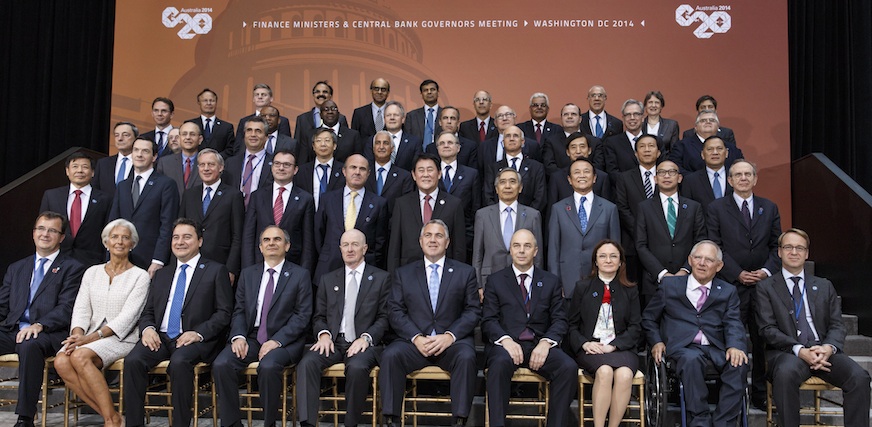No excuses: Why women need to step up
Want to improve the quality of the political talent pool? Tap into the 50 per cent of our population who have traditionally been excluded.
Finance ministers and central bank governors of the Group of Twenty nations gather for photo at the International Monetary Fund and World Bank meetings in Washington last month. (AP photo)
Share

The recent elections in the United States and Canada prove, once again, that there are not enough women in politics. And while systemic sexism doesn’t help, women themselves must shoulder part of the blame.
Francis Fukuyama once argued for more female politicians because their compassionate nature would ensure a more peaceful world. That would be nice, but we need more women simply because we need better candidates. From the United States Senate to Toronto City Hall, the vast majority of elected officials have two things in common: 1) you would not trust them to mow your lawn and 2) they are men.
The surest way to improve the quality of the political talent pool is tap into the 50 per cent of our population who have traditionally been excluded.
The current numbers are depressing. Measured by the proportion of women elected to the lower house, Canada is 55th globally, behind Iraq. The U.S. is 95th, behind (good Lord) Albania. In this month’s midterm Congressional races, only 17 per cent of primary candidates were female. Two men ran for every one woman in the recent New Brunswick election. In the Manitoba municipal elections 83 per cent of the candidates were men.
The implicit and explicit sexism in society, in the political parties, on the campaign trail, and within our elected bodies, present real obstacles. But, curiously, where those barriers are lowest, women are even less likely to run.
Consider Toronto’s civic elections. All that was required to become a candidate was $100 and a two-page form. And yet, in a cossetted city that considers itself a beacon for correct-minded progressives everywhere, only 12 per cent of the candidates were women. In Ottawa’s race, only 17 per cent of the candidates were women. Across North America, the numbers are consistent — in the United States’ 100 largest cities, only 13 per cent of elected officials are women.
Obviously there are complex and pervasive reasons for this. But the fact remains: even where it is the easiest for women to run, they are simply choosing not to do so.
Women are the only ones who can change this, by stepping up and placing their names on a ballot. And the excuses they use for not doing so aren’t good enough.
No network? Build it. Men don’t inherent a circle of cronies at birth. They gather them compulsively. Shamelessly. Watch a public speaker descend from the podium. They are immediately surrounded by young men asking for a business card. They may be pushy strivers, but women can and must do the same.
No money? Raise it. It may seem easy for a man to do this, but fundraising is a painful task for any gender. Nevertheless, it’s a simple three-step process: Pick up the phone. Ask someone for money. Do it again.
Lack confidence? Find it. Sadly, men come by it naturally. But this will help: Look closely at the slate of men you are proposing to run against. If that won’t bolster your self-assurance, nothing will.
No time? Make it. Fathers who run for office do not have an extra 20 hours in their week to play with their kids. They make a conscious choice to sacrifice time with their family for time on the campaign trail. Men don’t believe you can have it all. If you want to run for office, you will have to accept that, too.
If you are a woman who believes there needs to be more women in politics, then do something about it. Put your name on a ballot. If you are not willing to do this, then support a woman who is. Write a cheque. Volunteer on a campaign. Take a yard sign. Blaming sexism isn’t going to change things. But running for office probably will.